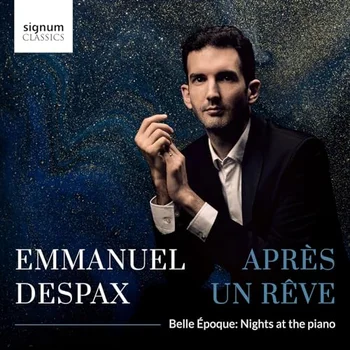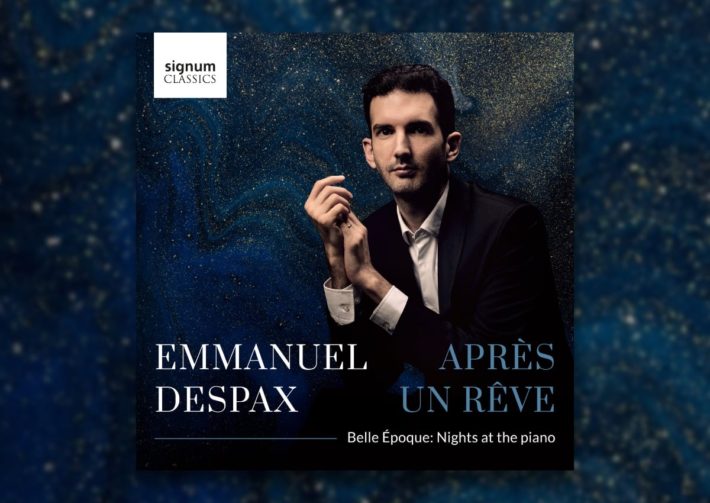Emmanuel Despax’s new curation features some well-loved works in the French piano repertoire. Among them is Poulenc‘s Soirées de Nazelles, Debussy‘s Claire de Lune, and Ravel’s tour-de force Gaspard de la Nuit. Bookending these works are an arrangement and an original work by the pianist.

Nazelles opens with a sort of waltz that is equal parts humorous, brash, breezy, and elegant. In what’s perhaps a reflection of Poulenc’s studies with Spanish pianist Ricardo Viñes, we also hear some Spanish elements at 1’06”, whose rhythmic patterns are capturesd with crisp clarity. In a vibrant portrayal of its eclectic elements, Despax seems indeed very much at home with the music. The quirkiness continues in Le comble (track 3) where again his articulation is what stands out. The music has its darker moments as we hear in La Suite dans les idées (track 6), whose uneasy, angular harmonies might call to mind those we hear in Ravel’s Le Gibet. Sections like the ominous bell tolls of the opening could use even more dramatic heft, but where the pianist’s sensitivities really come through are in the softest moments.
Clair de Lune is quite lovely. The freedom with which the performer treats the lines brings out a hidden whimsical aspect of Debussy’s lines. The push and pull of the phrases, while insistent at times, are appropriately so: they help add a forward movement and contour to prevent the work from sounding too atmospheric. The other notable aspect of the performance is the tone quality: the pianist’s approach to the keys is always gentle and mellow, but he has at his fingertips an array of textures that offer variety. In the repetition of the theme (0’39”), for instance, he uses the expanded registration and some very well-voiced chords as a means to generate an orchestral sound. This sound is what carries us forward in intensity to the high note at 1’50”.
While I was greatly looking forward to listening to Despax’s Gaspard de la Nuit, the set doesn’t quite match up to the other works. Ondine feels a bit metronomic with its measured tempo; what also takes away from its sense of mystery is overly-placed emphasis on the accompaniment figures. On their own, they are even and well-managed but in context, they blanket the melody which we end up straining to hear. Despax’s approach seems to be to bring out the intricacies of Ravel‘s writing but this backfires, especially when the work calls for more flexibility and caprice. Turn to Argerich’s DG account, where the voicing is faultless as is the gossamer accompaniment. Adding in the beautiful color changes and swells, hers becomes hard to beat.
Caution and details again prevail in Le Gibet which causes the music to move at a glacial pace. In a piece where the integrity of the theme depends mainly on its continuity, this proves problematic. For all of the wonderful colors that we do hear in Despax’s playing, it’s not enough to prevent our attention from wandering after a few minutes. Although Michelangeli’s 1959 recording is on the faster side, this choice of tempo is exactly what preserves the rhythmic toll of the B-flat ostinato and helps counterbalance the rather static melodic material. Despax’s middle section, however, is nicely done: the descending chord patterns are a delicate pianissimo but still manage to impart a truly chilling effect.
Scarbo’s infamous repeated notes and clarity of the devilishly difficult passages don’t disappoint, but the performance is ultimately in line with its other two counterparts. This is a work that actually does well to sound nervous, if you will, but this interpretation feels too placid. Perhaps the staccatos could use more electricity or moments like 6’30” would do better shrouded in softer dynamics and eeriness. Benjamin Grosvenor’s performance (Decca) is a fine example that seizes an exciting and tenuous balance between Ravel’s musicality and Scarbo’s unstable and diabolical nature.
The selections here are certainly enjoyable and well thought out: they balance familiarity with variety. Although there are some hit and miss moments, Despax on the whole proves himself to possess artistry—especially in the most nuanced moments of the pieces.
Recommended Comparisons
Cho | Grosvenor | Argerich | Michelangeli
Après un rêve
Emmanuel Despax – Piano
Signum Classics, SIGCD747



















